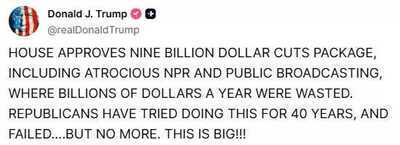US President Donald Trump 's proposal to cut $9 billion in federal spending targeting public broadcasters was passed by Congress on Friday. The bill now awaits the president’s signature.
It includes major broadcasters like Public Broadcasting Services (PBS) and National Public Radio (NPR).
The House approved the bill by a narrow margin of 216–213, with two Republicans, Brian Fitzpatrick of Pennsylvania and Michael Turner of Ohio, voting against it, reports New York Times.
A huge part of the cuts will reduce funding for foreign aid programs, including peacekeeping missions and global health initiatives that were previously authorised by law. Around $8 billion will be withdrawn from such assistance efforts, while another $1.1 billion is being pulled from the Corporation for Public Broadcasting, which funds NPR and PBS.
Russell Vought, director of the office of management and Budget, described the spending being eliminated as “wasteful and unnecessary” in the administration’s request to Congress. Local public broadcasting stations, which rely more heavily on federal funding than national outlets, are expected to be hardest hit by the reductions, according to USA Today.
Congress passed the bill just before the July 18 deadline. Without approval, existing funding levels would have remained in place. The Senate passed the bill earlier in the week with a 51–48 vote. However, two Republican senators, Susan Collins of Maine and Lisa Murkowski of Alaska, voted against the measure, raising concerns about Congress surrendering its constitutional power over federal spending.
Trump celebrated the vote on social media platform Truth Social, calling it a big victory and specifically highlighting cuts to “atrocious NPR and public broadcasting.” He claimed billions had been wasted and praised Republicans for finally achieving what he said they had failed to do for 40 years.

For Republican leaders, the measure was a small but meaningful step toward controlling federal spending. It's a small but important step toward fiscal sanity that we all should be able to agree is long overdue," said Senate Majority Leader John Thune of South Dakota.
It includes major broadcasters like Public Broadcasting Services (PBS) and National Public Radio (NPR).
The House approved the bill by a narrow margin of 216–213, with two Republicans, Brian Fitzpatrick of Pennsylvania and Michael Turner of Ohio, voting against it, reports New York Times.
A huge part of the cuts will reduce funding for foreign aid programs, including peacekeeping missions and global health initiatives that were previously authorised by law. Around $8 billion will be withdrawn from such assistance efforts, while another $1.1 billion is being pulled from the Corporation for Public Broadcasting, which funds NPR and PBS.
Russell Vought, director of the office of management and Budget, described the spending being eliminated as “wasteful and unnecessary” in the administration’s request to Congress. Local public broadcasting stations, which rely more heavily on federal funding than national outlets, are expected to be hardest hit by the reductions, according to USA Today.
Congress passed the bill just before the July 18 deadline. Without approval, existing funding levels would have remained in place. The Senate passed the bill earlier in the week with a 51–48 vote. However, two Republican senators, Susan Collins of Maine and Lisa Murkowski of Alaska, voted against the measure, raising concerns about Congress surrendering its constitutional power over federal spending.
Trump celebrated the vote on social media platform Truth Social, calling it a big victory and specifically highlighting cuts to “atrocious NPR and public broadcasting.” He claimed billions had been wasted and praised Republicans for finally achieving what he said they had failed to do for 40 years.
For Republican leaders, the measure was a small but meaningful step toward controlling federal spending. It's a small but important step toward fiscal sanity that we all should be able to agree is long overdue," said Senate Majority Leader John Thune of South Dakota.
You may also like

'Tried to belittle Marathi': Raj Thackeray slams assembly brawl; defends MNS 'soldiers'

Adults baffled by 11+ maths question that is 'too hard to figure out'

Netflix's Selling Sunset lands season 9 release date as A-lister's sister joins cast

UK's 'most scenic camping spots' perfect for a summer staycation

Urgent recall of hot-weather essential sold by Amazon over 'electric shock' fears






